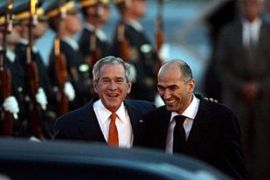EU and Bush warn ‘nuclear’ Iran
US and EU ready to go beyond latest UN sanctions against enrichment programme.

Tehran insists the programme is strictly for civilian purposes, to generate electricity.
It remains unclear how far the Europeans, who rarely echo Bush’s harsh rhetoric against Iran and have sometimes been reluctant to get tougher, would be willing to go.
Washington has been pressing the EU to deny some Iranian banks access to the world financial system.
Speaking at the summit, Benita Ferrero-Waldner, the European external relations commissioner, said: “We want to indeed show to Iranians that we mean it very seriously… [We are] particularly thinking of asset freezes.”
An Iranian newspaper reported on Tuesday that Iran was withdrawing assets from European banks and converting some foreign exchange assets into gold and equities in a bid to neutralise the impact of international sanctions.
Unpopular president
In his final tour of Europe as president, Bush is also due to visit Germany, France, Britain and Italy.
Bush, who has been accused by critics of “cowboy diplomacy” during much of his presidency, has tried to take a more co-operative approach with allies in his second term, hoping to forge a foreign policy legacy defined by more than Iraq.
However, the president acknowledges he is unpopular in Europe, as well as at home.
Speaking to Slovenia’s Pop TV, he said: “A lot of people like America. They may not sometimes necessarily like the president.”
With regard to climate change, EU policymakers say they have given up trying to get Washington to join with the bloc in signing up now to binding cuts of greenhouse gas emissions.
US officials insist that big developing nations such as China and India must make similar commitments too, and they say Europeans hoping for a shift in position under a new president will be disappointed, whoever wins the election in November.
Money matters also figure in Bush’s week-long trip.
He made it clear before leaving Washington that he would underline his commitment to a “strong dollar”, the weakness of which is seen as a barometer of the US economic slowdown, and his concern about record oil prices.